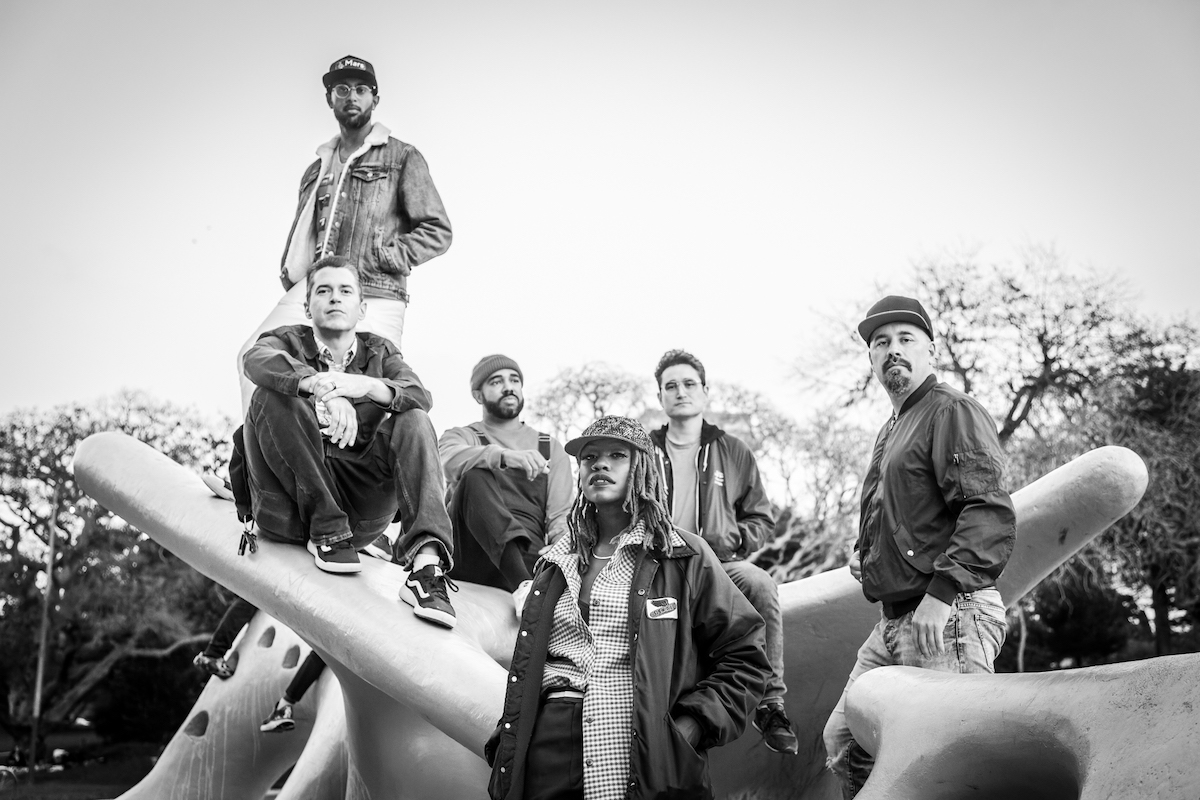The music on Nowhere, the latest album from The Seshen, displays a courageous vulnerability. Singer/guitarist Lalin St. Juste and bass player/producer Akiyoshi Ehara helm the Oakland-based band, though they both consider the band part of their extended family. “The group grew out of the jam sessions we had at our home when we were starting out,” St. Juste said. “At first, Aki was just adding bass to the songs I was writing. As we came together as a band, we started getting more expansive in our musical ideas.”
Ehara said the growing acceptance of electronic music opened up new avenues of musical expression for them. “I began working on the sonic textures and repeating patterns that characterize the songs,” Ehara said. “I wanted this album to be a meditation that would bring you into the world that Nowhere exists in. It represents a lot of the feelings I was experiencing during a period of intense change. I was using music to center myself and make sense of everything that was going on.”
St. Juste and Ehara put together most of the album during the pandemic lockdown. At the same time, they were coming to terms with the end of their marriage and their desire to keep making music together.
“We weren’t living together or rehearsing with the band for a big chunk of time,” Ehara said. “We sent musical and lyrical ideas back and forth on email files. It was harder in some ways, but there was also less overthinking of things since the time we had together was limited. We were having a hard time emotionally, but even with the uncertainty, we were continuing to write. Big feelings were pouring out of me, so I was turning out a lot of music. It was something consistent and reliable I could go to.”
St. Juste said, “We could lean into music when there was nothing else to lean into. Even though it was hard, our connection inside the music was powerful. That shared passion for music was what brought us together, years ago, and it kept us together through all the changes. There’s a lot of musical growth in this album. I’m playing around with more sounds vocally, and Aki is killing it on the production. Making it was really vulnerable for both of us. It’s our story, and being open about our personal life together, and apart, is pretty big.”
Ehara wrote, performed, recorded and produced the album in the studio he operates out of his home. The music was slowly layered up, with the other band members adding their input to the arrangements. “Everyone—Mahesh [Rao, keyboard player;] Chris [Thalmann, drummer;] Kumar [Butler, Ableton sequencer;] and Mirza [Kopelman, percussionist]—contributed ideas,” Ehara said.
The music on Nowhere plays like a suite, slowly unfolding a story of love that endures in the face of unexpected changes: spiritual, personal and societal. Elements of psychedelia, hip-hop, pop, R&B, West African music, dub and indie rock come together under an umbrella of experimental electronica for a singular experience.
The title track opens the album with the slow pulsation of an electronic keyboard that gives way to a galloping, throbbing beat that’s equal parts club music and Spaghetti Western soundtrack. St. Juste intones a wordless introduction, then moves deeper emotionally, describing a failing relationship: “All the moments/ I wish would last/ pass by so fast.” Hand claps and a funky dance beat introduce “Air,” an R&B ballad. St. Juste retreats into memories of happier times, singing with a detached sadness that intensifies the longing of the lyric.
A flurry of percussion, shimmering guitar chords and vocals processed with echoing dub effects give “Gone Under” a morose feel. St. Juste’s staccato delivery combines jazzy melismas and the rhythms of hip-hop. “Lost at Night” opens with a propulsive backbeat and a shimmering, unforgettable synthesizer hook. St. Juste’s wide-open sighs on the chorus deliver more emotion than words can express. “The music is all energetic and engaging,” St. Juste said. “It’s also heartfelt, with a full sound to portray the emotions we’re conveying.”
Ehara and St. Juste began collaborating after they met in Ghana, during the semester they spent abroad in college. Ehara was studying ethnomusicology; St. Juste was majoring in African Literature. He carried his bass; she, her guitar. During their spare time, they began singing their favorite songs by other artists, together.
“I was shy about sharing my songs at first,” St. Juste said. “I started singing to deal with my grandmother’s death. I could express my emotions better in the songs I was putting on tape in my bedroom.”
Born in Oakland, Ehara grew up in Richmond. “My dad loved funk,” he said. “I grew up with Tower of Power, Earth, Wind & Fire and Marvin Gaye, but I got started playing when I joined punk bands in high school. Once I was making music, I was hooked. I studied theory, got interested in the sounds I heard on records and went into production.”
After graduation, the couple moved to Oakland, started a band and got married. The band evolved along the way. “We’ve had a few different members over the years, but our current iteration has been in place for quite a while,” St. Juste said. “I want to make music that resonates with people, songs that will be a source of healing and inspiration. At the end of the day, it’s always raining somewhere, someone is always feeling something challenging. My main purpose is to share my human experience, in a vulnerable way, that connects to other people.”
Listen to ‘Nowhere’ on The Seshen’s Bandcamp page: theseshen.bandcamp.com/album/nowhere. St. Juste’s solo project is available at: lalin.bandcamp.com/album/vertulie. The band’s website is: theseshen.com.











